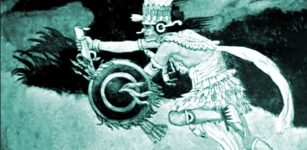Barbarians Were People Who Didn’t Speak Greek
Conny Waters - AncientPages.com - Who were the Barbarians? The term “Barbarians” is misused today. In modern times, we often say Barbarians are uncivilized people or evil people.
However, the true meaning of the word has been forgotten. The word originated in ancient Greece and initially referred to people who did not speak Greek.
A preconnesian marble depiction of a barbarian. Second century AD. Barbarian, so-called Dacian prisoner, Roman artwork. Image credit: Marie-Lan Nguyen - CC BY 2.5
Those of relatively advanced civilizations used the term to describe others considered less civilized. It referred to people from more primitive cultures who usually relied on physical strength more than intellect.
According to Strabo (64 BC - 21 CE), a Greek geographer and historian, people known as Carians, of all the “barbarians,” had a particular tendency to intermingle with the Greeks.
“This was particularly the case with the Carians, for, although the other peoples were not yet having very much intercourse with the Greeks nor even trying to live in Hellenic fashion or to learn our language ... yet the Carians roamed throughout the whole of Greece serving on expeditions for pay. ... and when they were driven thence [from the islands] into Asia, even here they were unable to live apart from the Greeks, I mean when the Ionians and Dorians later crossed over to Asia.” (Strabo 14.2.28)
Today, “barbarian” has another meaning and is used to describe someone using excessive violence without considering other options.
According to Konstantinos Vlassopoulos, a professor of Greek history at the University of Nottingham, the earliest attestation of the word barbarian in Greek literature is in Homer’s descriptions of the Carians as ‘barbarophonoi.’
Vlassopoulos notes that the ancient Greeks used this word in a confusing and contradictory fashion.
They had no agreement among the ancient Greeks regarding who spoke Greek and who didn’t, at least until Alexander the Great.
There “existed a variety of local and regional dialects, which were mutually comprehensible to a larger or smaller degree,” writes Vlassopoulos in his book “Greeks and the Barbarians.”
So, the original meaning of the word “barbarian” did not refer to acts of evil but to those who were not Greek or did not speak Greek. Also, who didn’t talk Greek was a matter of debate among the ancient Greeks.
Written by Conny Waters – AncientPages.com Staff Writer
Copyright © AncientPages.com All rights reserved. This material may not be published, broadcast, rewritten or redistributed in whole or part without the express written permission of AncientPages.com
Updated on January 18, 2023
Expand for referencesReferences:
Malcolm Heath. Review of Inventing the Barbarian, by Edith Hall. The Classical Review 41, no. 1 (1991): 90–92.
More From Ancient Pages
-
 Mystery Of Lama Dashi-Dorzho Itigilov: A Mummy Whose Body Defies Time
Featured Stories | Sep 21, 2018
Mystery Of Lama Dashi-Dorzho Itigilov: A Mummy Whose Body Defies Time
Featured Stories | Sep 21, 2018 -
 1.5 Million-Year-Old Human Vertebra Discovered In Israel’s Jordan Valley Sheds New Light On Migration From Africa To Eurasia
Archaeology | Feb 3, 2022
1.5 Million-Year-Old Human Vertebra Discovered In Israel’s Jordan Valley Sheds New Light On Migration From Africa To Eurasia
Archaeology | Feb 3, 2022 -
 Vikings’ Hideouts, Harbours And Homes: How Norse Warriors Owed Their Success To Their Encampments
Featured Stories | Feb 17, 2023
Vikings’ Hideouts, Harbours And Homes: How Norse Warriors Owed Their Success To Their Encampments
Featured Stories | Feb 17, 2023 -
 What Were The Most Important Medieval Marketplace Rules?
Ancient History Facts | Mar 25, 2024
What Were The Most Important Medieval Marketplace Rules?
Ancient History Facts | Mar 25, 2024 -
 Why Did Sages And Shamans Repeatedly Visit The Mysterious Finnish Pirunkirkko Cave (Devil’s Church)?
Archaeology | Nov 27, 2023
Why Did Sages And Shamans Repeatedly Visit The Mysterious Finnish Pirunkirkko Cave (Devil’s Church)?
Archaeology | Nov 27, 2023 -
 Tezcatlipoca: Enigmatic Aztec God Who Looked Inside People’s Hearts And Observed Their Deeds On Earth
Aztec Mythology | Jul 22, 2021
Tezcatlipoca: Enigmatic Aztec God Who Looked Inside People’s Hearts And Observed Their Deeds On Earth
Aztec Mythology | Jul 22, 2021 -
 Ancient Symbol Seed Of Life Contains Hidden Secrets Of The Seven Days Of Creation
Ancient Symbols | Oct 8, 2017
Ancient Symbol Seed Of Life Contains Hidden Secrets Of The Seven Days Of Creation
Ancient Symbols | Oct 8, 2017 -
 What Can Archaeology Tells Us About Climate Change?
Archaeology | Aug 9, 2021
What Can Archaeology Tells Us About Climate Change?
Archaeology | Aug 9, 2021 -
 Cherokee Gourd Rattles – Protection Against Evil Spirits And Other Danger
Ancient Traditions And Customs | Jun 7, 2019
Cherokee Gourd Rattles – Protection Against Evil Spirits And Other Danger
Ancient Traditions And Customs | Jun 7, 2019 -
 Boomerangs Were Used To Shape Stone Tools By Aboriginal People
Archaeology | Aug 16, 2022
Boomerangs Were Used To Shape Stone Tools By Aboriginal People
Archaeology | Aug 16, 2022 -
 The Black Pyramid Of Amenemhat III – Mysterious Underground Chambers And Lost Ancient Treasures
Featured Stories | Aug 9, 2021
The Black Pyramid Of Amenemhat III – Mysterious Underground Chambers And Lost Ancient Treasures
Featured Stories | Aug 9, 2021 -
 Mythical Fiery Bird Phoenix In Mythologies Of Many Ancient Cultures
Featured Stories | Mar 23, 2017
Mythical Fiery Bird Phoenix In Mythologies Of Many Ancient Cultures
Featured Stories | Mar 23, 2017 -
 Never Explained Mystery Of Star-Shaped Towers Of The Himalayas
Featured Stories | Nov 24, 2014
Never Explained Mystery Of Star-Shaped Towers Of The Himalayas
Featured Stories | Nov 24, 2014 -
 3,500-Year-Old Skull And Thighbone Discovered In Sapinuwa Antique City Of Central Anatolia
Archaeology | Dec 3, 2019
3,500-Year-Old Skull And Thighbone Discovered In Sapinuwa Antique City Of Central Anatolia
Archaeology | Dec 3, 2019 -
 Is Mysterious Herlaugshaugen The Ship Burial Of Viking King Herlaug?
Archaeology | Jul 11, 2023
Is Mysterious Herlaugshaugen The Ship Burial Of Viking King Herlaug?
Archaeology | Jul 11, 2023 -
 On This Day In History: Albertus Magnus – Medieval Person Of Great Historical Importance Died – On Nov 15, 1280
News | Nov 15, 2016
On This Day In History: Albertus Magnus – Medieval Person Of Great Historical Importance Died – On Nov 15, 1280
News | Nov 15, 2016 -
 New Discovery: Fragments Of Pyramid Dated To 13th Dynasty Discovered In Dahshur Necropolis
Archaeology | Apr 3, 2017
New Discovery: Fragments Of Pyramid Dated To 13th Dynasty Discovered In Dahshur Necropolis
Archaeology | Apr 3, 2017 -
 Secrets Of Ark of The Covenant Revealed In Ancient Manuscript
Biblical Mysteries | Jul 19, 2014
Secrets Of Ark of The Covenant Revealed In Ancient Manuscript
Biblical Mysteries | Jul 19, 2014 -
 Perplexing Accounts Of Ancient People Who Demonstrated Incredible Powers Of The Human Mind
Featured Stories | Feb 1, 2019
Perplexing Accounts Of Ancient People Who Demonstrated Incredible Powers Of The Human Mind
Featured Stories | Feb 1, 2019 -
 Utsuro Bune: Ancient Extraterrestrial Encounter With A ‘Hollow Ship’ And An Alien Visitor
Featured Stories | Jun 11, 2020
Utsuro Bune: Ancient Extraterrestrial Encounter With A ‘Hollow Ship’ And An Alien Visitor
Featured Stories | Jun 11, 2020

